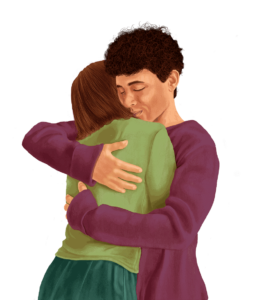One minute she’s laughing and showing you a funny YouTube video, and the next minute she’s angry, marching to her room and slamming the door.
You tell yourself she’s just a typical moody teenager, and you’re probably right. But how do you know for sure? Is there something else bothering her that’s making her act this way? Is she depressed? Is she anxious, stressed, or even worse … using alcohol or drugs?
Knowing the difference could be critical. Here are things to look for to determine the level of your teen’s “moodiness.”
Sleeping Habits. Teens do experience natural shifts in their sleep cycles, making it difficult to fall asleep until later at night, so they are often tired during the day or sleep late on weekends. That is normal. However, sleeping excessively can be a sign of depression, using sleep as an escape from reality. On the flip side, being up all night and not being tired the next day is also concerning.
Eating Habits. Did your teen’s once healthy appetite suddenly disappear? Have they discontinued eating dinner with the family or skipping breakfast? Has your son or daughter gained or lost significant weight over a short period with no explanation? These changes could be a symptom of depression. You’ll want to make sure this isn’t a medical condition, so a good place to start is with your pediatrician.
Social Interactions. Teenagers often spend more time alone in their rooms and enjoy their privacy. However, if you notice your teen spending a lot of time alone rather than being with friends or doing things they once enjoyed, it’s time to talk to your teen about why he or she doesn’t want to spend time with friends and family. Try to determine if there’s a particular reason they always want to be alone, but don’t pry too much. Privacy is important to them. If it’s about being online, you may need to limit their online activity and get them interested in other activities once again. But let’s be honest, you, as parents, need to model this behavior.
Risky Actions. Teens who are depressed often have low self-esteem and may take risks, like putting themselves in dangerous situations, drinking alcohol, smoking cigarettes, or trying drugs. Parents need to get actively involved to prevent an irreversible mistake that can have a life-long impact.
Poor Grades. Depression impacts your ability to concentrate, focus, make decisions, and think clearly, which can affect your teen’s school performance (as well as his or her performance at a job or in sports and other activities).
Physical Complaints. Stomachaches, headaches, or other vague physical symptoms can be associated with depression. It’s important to rule out a medical condition, so it’s good to check with your child’s pediatrician.
What to Do
If your teenager is demonstrating some of these behaviors, and you’ve ruled out any medical conditions, take notice, ask questions, show support. Just knowing you’re concerned can help relieve some of the pressure and anxiety your teen may be feeling.
Follow through on any support and help you offer. Let them know you’re there if they need to talk and then LISTEN. Keep in mind, they may not want advice, they may just want to vent and unload. Be sympathetic to how they are feeling.
What Not to Do
Don’t pressure or lecture your teen. Don’t increase their feelings of low self-esteem by making them feel shame or ridicule. Do not let your teen suffer in silence, and please do not ignore the signs and risk a tragic outcome.
Take Action if Necessary
If you have concerns and are not sure how to help your teen, get help from Core Recovery or another mental health provider. Your child’s life could depend on it.





